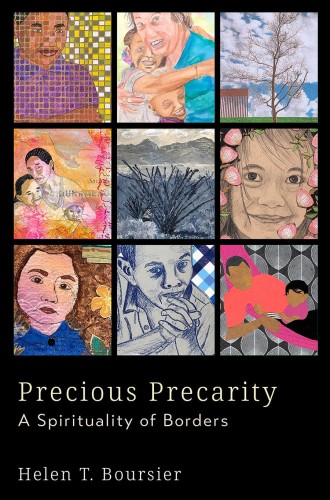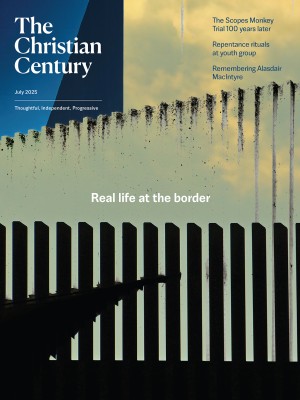Ecclesiastes and the heart-wrenching lives of migrants
Helen Boursier explores spirituality before, during, and after people decide to cross into the United States.

Precious Precarity
A Spirituality of Borders
The most disheartening tendency of theology is its imitation of Moses at Mt. Sinai, hurrying edicts from on high down to the poor sods below. Belittling at best, theology as such looks less like reality than like the sacred cow it condemns. More and more these days, I find myself hungry for conversation partners who lift theological discourse to the experience of human dignity, who dare to run uphill toward the cloudy mountaintops with life’s messiness in tow, full of wonder, graciousness, and tears.
It was with this kind of hunger that I picked up Helen Boursier’s Precious Precarity: A Spirituality of Borders. I’m the pastor of a congregation 30 minutes from one of the world’s busiest pedestrian border crossings, a clergyperson who is involved in civil disobedience at the border and theological witness to its continued militarization, and a preacher in a community that includes many Border Patrol and ICE agents. So I hoped that I may be Boursier’s primary audience. As it turns out, I needed this book even more than I realized, a fact that both troubles and inspires me.
Read our latest issue or browse back issues.
Boursier aims her discourse at faith leaders who find themselves unwillingly steeped in a stew of confusion, hatred, xenophobia, punditry, and bad policy. Her previous book, Willful Ignorance: Overcoming the Limitations of (Christian) Love for Refugees Seeking Asylum, used ethnography and social analysis to reveal the ambivalence of faith leaders toward border concerns. For this work, Boursier changes tack, running her theological project up the mountaintop, tears in tow.
By taking the spiritual lives of migrants as the starting point for her examination, Boursier lifts the forgotten fleshiness of their experience into the realm of humanity. She accomplishes this by exploring the manifold spiritualities of migrants’ lives before, during, and after their decision to cross into the United States. Along the way, Boursier enfleshes her subjects as ends in themselves, employing Ecclesiastes as a scriptural guide through the heart-wrenching lives of migrants.
Boursier reveals Qohelet to be an excellent guide through migrants’ experiences, from cynicism and dissent to paradox, risk, and even joy. These themes, among others, emerge not only from the biblical text but from within the migrant experience. At the intersection of Ecclesiastes’s reflections on divine justice and the cries of the real subjects Boursier studies, she writes, “Ecclesiastes, and many of the [migrant] families, steadfastly affirms that God is in control, even though it’s impossible to know who, what, when, where, or how God will ultimately dispense justice, paralleling a spirituality of borders that also trusts the ultimate justness of God.”
Lest her readers forget the stakes, Boursier reminds us that spirituality at the borderlands isn’t limited to migrant families. She notes that “many of the volunteers and advocates affirm belief in God, not necessarily a churchy or religious god but a Supreme Something that imbues a moral calling to justice.” My own experiences of borderland advocacy have been filled with passionate, post-Christian activists. The implication is clear: Faithful people aren’t leaving God, but they are leaving the church because it doesn’t feel faithful. Faith leaders ignore borderland issues at their own peril.
Occasionally I found myself hoping that Boursier’s examination might go deeper still. The borderlands, as I have come to understand them, are not a uniform story of migration. In my context of the San Diego area, for example, more than 150,000 people cross the border each workday, mostly from Mexico to the United States for work. Borderland people often cross in the other direction as well, as high housing costs in Southern California drive US citizens south for less expensive housing. I am curious about how Boursier might examine the spiritual complexity of everyday indignities and injustices experienced by these people at the border. Similarly, I wonder about the widespread occurrence, which I’ve both frequently witnessed and personally experienced, of burnout among activists in the borderlands, as well as the spiritual ramifications of whole communities of well-meaning church folks walking away from such projects, constantly exhausted by the senseless violence witnessed there.
These quibbles, however, are far less than enough to warrant any dismissal of Boursier’s project. I have already spoken to my bishop and other church-based activists about using her work as a guide for exploring our local context and mutual activism, which is as high praise as I can give.
From my perspective as a member of Boursier’s intended audience—an accidentally hard-hearted American preacher in the mythical soupiness of borderland realities—Precious Precarity accomplishes its aims and then some. The book’s blows to my protective distance from the border and its misery are relentless. There are moments in the writing when one can detect the kind of philosophical distance we might expect of academic work, deploying critical tools for the purposes of abstraction and evaluation. Yet there are other moments when the pain of the subject breaks through, and we glimpse Boursier’s own heart as a witness to the crucified in our backyard.
Months ago, a group of church leaders from my denomination gathered near the Tijuana border crossing in San Diego County to discuss consolidating our ministries there. We had invited a consultant to help us articulate a set of manageable, mutually held aims around shared border activism. In the room were pastors who preside over eucharistic services at the Border Church (see “Worship through a wall,” April 22, 2020), volunteers who regularly drive asylum seekers from the border to the airport, folks who make weekly lunches for migrants as they pass through the region to safety, activists who drop jugs of water in the desert on secretive backpacking trips, church leaders who host refugee families in church basements, and more.
At one point, the consultant paused to ask, “So, what do we call these people you all want to help? Migrants? Asylum seekers? Border crossers? Refugees? Illegals?” We all froze in a moment of confusion, stalled by the mystifying depths of international law, US immigration policy, punditry, and politicization.
Someone finally chimed in to say, “beloved children of God?” Shame crept over the room as we recognized that despite our best efforts, none of us had considered that name as a possibility.
In examining migrants’ spiritual lives and displaying rich stories of abiding faithfulness in the face of incredible trauma, Boursier seeks to accomplish in the hearts of her audience what our swollen intuitions of right and wrong cannot. In Boursier’s telling, the borderlands function not only as a site of examination but also as one for redemption, that is, our redemption.






